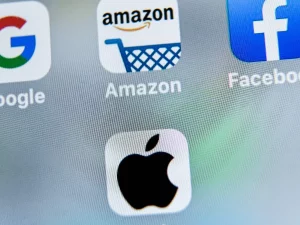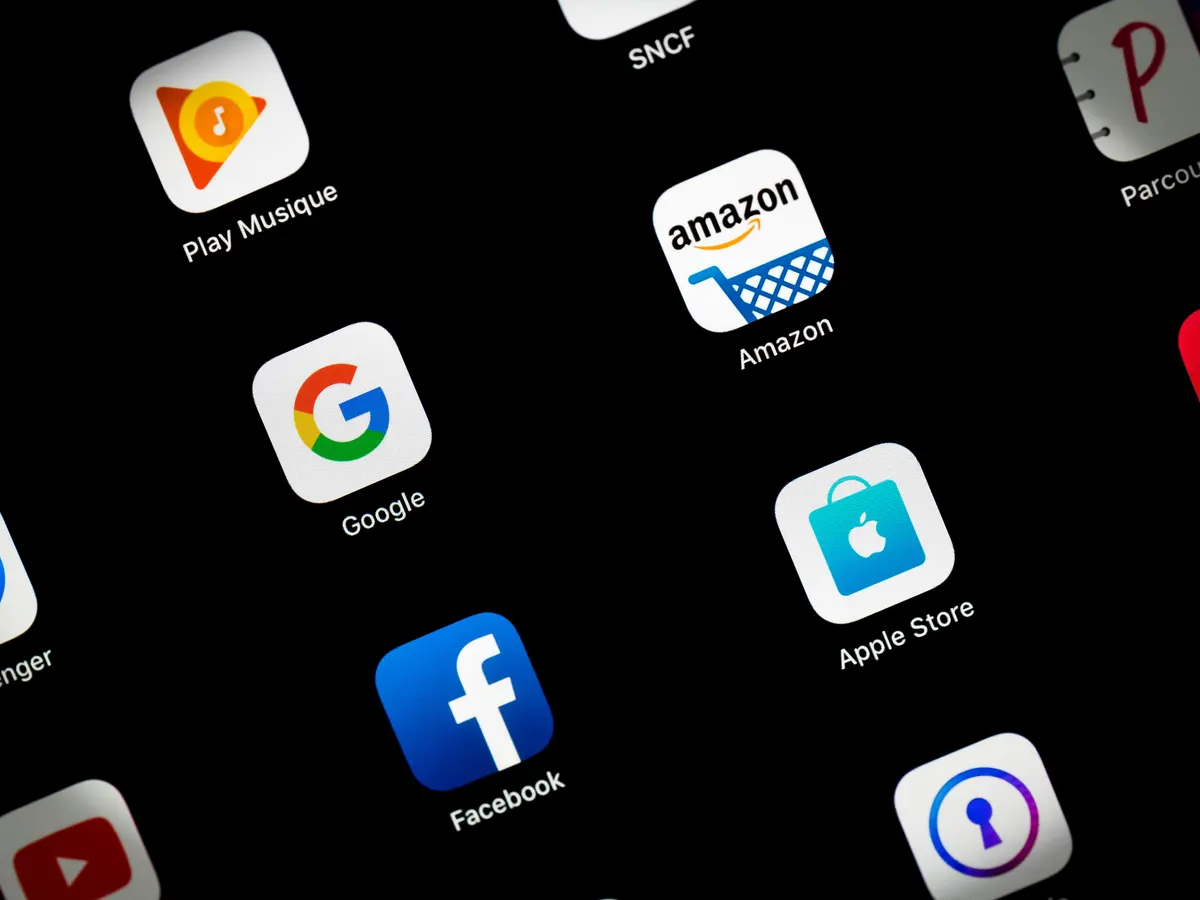Tech monopolies and anti-competitive behavior refer to situations in which a company dominates a specific industry or market and uses its power to prevent competition from emerging or restrict other companies’ ability to compete effectively.
For Instance, Imagine having a particular vendor who sells your favorite meal. You notice they come to the marketplace anytime they feel like it.
Another worse scenario is when you’re so hungry, and they are not around or available. You can tell how hungry, frustrated, and hungry you’ll be. This is one of the significant disadvantages of Monopoly. Now consider Tech Monopoly.
Now to demonstrate Tech Monopoly, A long-awaited report on the dominance of the four most prominent tech companies from top Democratic congressional lawmakers had a clear message.
According to the report, Amazon, Apple, Facebook, and Google engage in anti-competitive practices. As a result, U.S. antitrust rules need to be updated to allow for more competition in the U.S. Internet economy.
Although Jordan’s report has yet to be made public, Reuters coverage suggests that it will concentrate on his shouted-over claims of the supposed anti-conservative bias of tech firms, which he has made in the past.
These partisan differences are somewhat irrelevant because Republicans and Democrats both believe that Big Tech is a threat to the free market, regardless of the details of how to attack the industry.
Read Also- The digital divide: how technology exacerbates inequality
Example of Monopolistic Tech Companies
The report makes several critical assertions about each of the four leading tech giants, which are broken down as follows:
Amazon
In the U.S., Amazon accounts for nearly 40% of all e-commerce sales, outpacing Walmart, ranked second by a factor of more than seven.
But, according to the Democrats’ report, the tech behemoth has abused its dominant position to harm competitors. (The report asserts that Amazon’s U.S. e-commerce market share is closer to 50% or more in the nation than the near-40% figure frequently cited based on estimates from the research firm eMarketer).
In addition, the company allegedly unfairly gathers data and information from its third-party vendors, which it then uses to strengthen the retail portion of its business.
This includes giving its product names preferential treatment over those of rivals, providing this merchandise with exclusive shelf space on its virtual shelves, and giving it a top priority in search results.
Another complaint is that Amazon can charge sellers ever-rising fees due to its dominant position. Since most sellers and companies rely on Amazon as their primary sales channel, they need more negotiating power. Amazon also penalizes vendors who offer their goods for less on competing shopping websites.
In a blog post, Amazon debunked claims that it engaged in anti-competitive business practices and claimed that any antitrust regulatory action would “primarily have the effect of driving millions of independent retailers out of online stores.”
“Regulators pay close attention to all large organizations, and we appreciate their examination. However, the assumption that success can only result from anti-competitive behavior is simply incorrect, as large companies are not by necessity dominant.
According to a study, Facebook has increased its monopolistic power in the social media sector by unfairly harming rival companies like Instagram and employing a “copy, acquire, kill” strategy against them. (which the company purchased in 2012).
The report contends that Facebook’s purchase of Instagram was an overt effort to “neutralize a nascent competitive threat.”
It further stated that after purchasing Instagram, Facebook allegedly obstructed the photo-sharing app’s growth on purpose so that it wouldn’t compete with Facebook internally.
Many internal emails, memos, and testimony from top Facebook employees, including CEO Mark Zuckerberg, support the claim that Facebook destroyed Instagram by exercising monopoly power.
The article also quotes a former senior Instagram employee who testified before Congress that after the purchase, Zuckerberg supervised “brutal infighting between Instagram and Facebook” and slowed Instagram’s organic growth to benefit Facebook itself.
The Instagram leaker even used the phrase “collusion, but within an internal monopoly” to describe it. Facebook’s Christopher Sgro disagreed with the report’s findings, claiming that Facebook is an example of American achievement.
He asserts that to compete with a broad range of services used by millions or even billions of people. Every industry involves acquisitions, one method we use to develop new technologies to benefit people more.
Facebook has invested billions in Instagram and WhatsApp, which has led to their newfound prosperity. Both the purchase period and the current market are highly competitive. Regulators carefully examined each transaction and correctly found no rationale for concern.
Read Also: Why technology is making us less social?
Apple
The study released claims that Apple controls the software downloaded onto 50% of all U.S. mobile phones. That is a direct reference to Apple’s App Store, the only source from which you can obtain apps if you have an iPhone.
According to the subcommittee staff’s report, Apple has unfairly favored its apps while excluding some competitors from its store and charging fees that some app developers have described as “exorbitantly high.”
When the creator of Fortnite, Epic Games, informed its users they could purchase the game’s virtual currency directly from Epic rather than through the Apple iOS version of the app, such a conflict between Apple and developers over in-app fees exploded into the public limelight earlier this year.
The cause? The 30% fee that Apple levies for these in-app purchases were something Epic wished to avoid. Following a legal battle, Apple removed the game from the App Store. The report mentions numerous instances similar to this one as just one example.
Apple claimed in a statement to Recode that it “does not have a dominant market share in any category where we do business.” Apple, naturally, disagreed with the conclusions of the Democrats’ study.
Over 85% of the $138 billion in sales made possible by the App Store in the United States last year went to independent makers. Moreover, apple’s commission rates are consistent with what other app stores and gaming platforms charge.
According to the Democrats’ report, Google enjoys a monopoly in the online search and marketing sectors, which it has kept through two distinct anti-competitive practices. This has resulted in an “ecosystem of interlocking monopolies.”
The report describes “vertical search providers” as search engines for particular subjects, such as Yelp for restaurants or Expedia for travel. The first method involves starting an “aggressive campaign to undermine” these providers.
According to the report, Google favors subpar content in its search results over some of these other businesses.
The report claims that “a series of anti-competitive contracts” that forced people to depend on Google search when using phones with the Android operating system is the second significant instance of Google’s anti-competitive behavior.
According to the report, documents reveal that Google required smartphone makers to pre-install and set Google’s apps as the default on their devices.
Naturally, Google disagreed with the reports, claiming they “feature outdated and false allegations from business rivals about Search and other services.”
Americans don’t want Congress to harm the free services they use daily or Google’s goods, according to a statement from Julie McAlister, a Google spokesperson.

Downsides of Tech Monopoly
Most Americans consider the absence of competition among the big tech companies a severe issue, with 27% describing it as “very serious” and 34% as “somewhat serious.”
Only 16% of people say it’s “not at all serious” or “not very serious,” and 23% are unsure. Over 85% of the $138 billion in sales made possible by the App Store in the United States last year went to independent makers. Apple’s commission rates are consistent with what other app stores and gaming platforms charge.
The lack of competition between technology companies ranked No. 17 in terms of the percentage of Americans who are very concerned, behind concerns about privacy, election interference, and the outsourcing of jobs, in a recent poll that asked respondents to rank their level of respect about 20 issues about the U.S. tech industry.
Stiffled Innovation
The ability of tech monopolies to stifle innovation is one of their primary drawbacks. When one business controls most of a market, it may lose its drive to develop and enhance its goods and services.
Because of this, the business as a whole might innovate or advance less, which would be bad for customers.
Increase in Consumer Prices
Monopolies in the technology industry can also increase consumer prices, which is an issue. Instead of setting prices based on competition or the actual cost of production, a company with a monopoly in a market can set prices at a level that maximizes its profits.
Because they might not have any other choices, consumers may pay higher costs for the good or service.
Absence of Close Substitutes and Customer Options
Monopolies in the tech sector can reduce consumer options. When a business holds a trust, it can decide which goods or services consumers can access and restrict their ability to select from various choices.
This can be especially problematic when access to different information and viewpoints is crucial, like social media or search engines.
Hindrance to Competitive Success
Tech monopolies can hinder other businesses’ capacity for competitive success. Other firms may find joining a market or competing successfully challenging if a dominant company controls key technologies or distribution channels.
This could lead to a lack of variety in the market and a decline in general competition, both of which would be bad for consumers.
Solution to Tech Monopoly
Governments may enact rules to stop anti-competitive behavior, dismantle monopolies, or promote the entry of new competitors into the market to resolve these issues. These steps could aid in fostering innovation, bringing down costs, expanding customer options, and enhancing the general health of the tech sector.
The more than 400-page report calls for enacting new laws that could split up tech companies and hinder their ability to pursue acquisitions.
It also urges clarifying existing antitrust laws to make them more easily enforced, especially for tech companies. However, the report’s recommendations won’t result in immediate action against these companies; they will only serve as high-level advice to Congress for possible future legislation.

